Craccum Throwback | Brett Buckmaster: a counter-protester's tragedy in two acts
During the first weeks of the 1981 Springbok Tour protests, an 'ordinary, non-political student' named Brett Buckmaster campaigned against AUSA's funding of anti-tour student protests. He did not succeed. [Craccum #18, 1981]
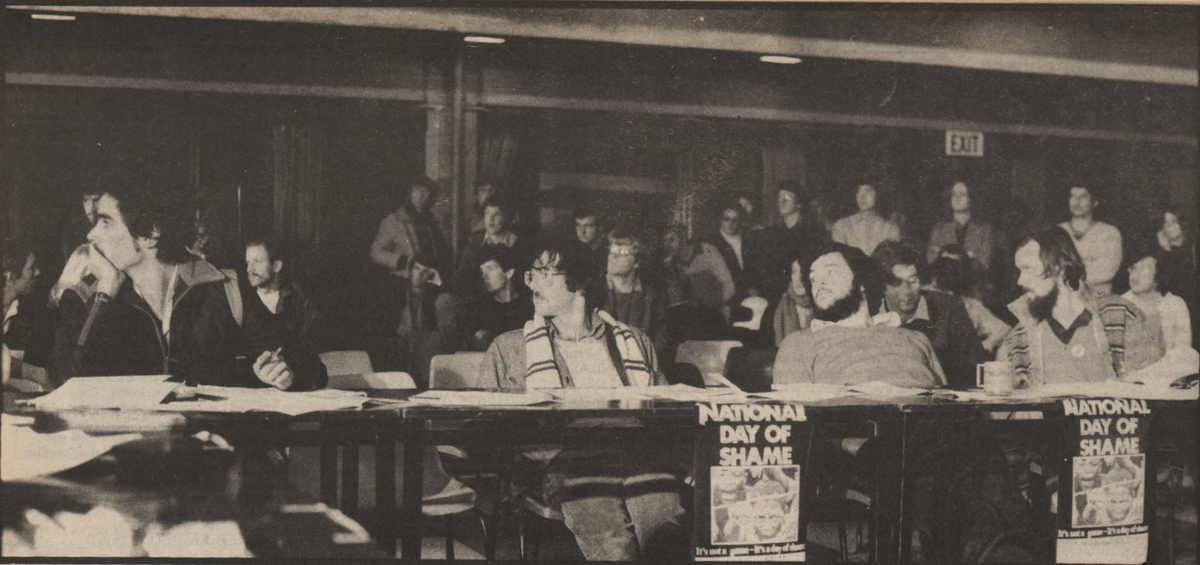
To view issues of Craccum from the years 1927-1990, please refer to The Bookshelf, hosted by the University of Auckland Library. The years 1991-2015 have not yet been digitised, so please visit the UOA General Library for assistance viewing UOA General Library print records.
[Originally published 28 July, 1981 (Issue #18) and titled 'TANIA OF THE TOUR']
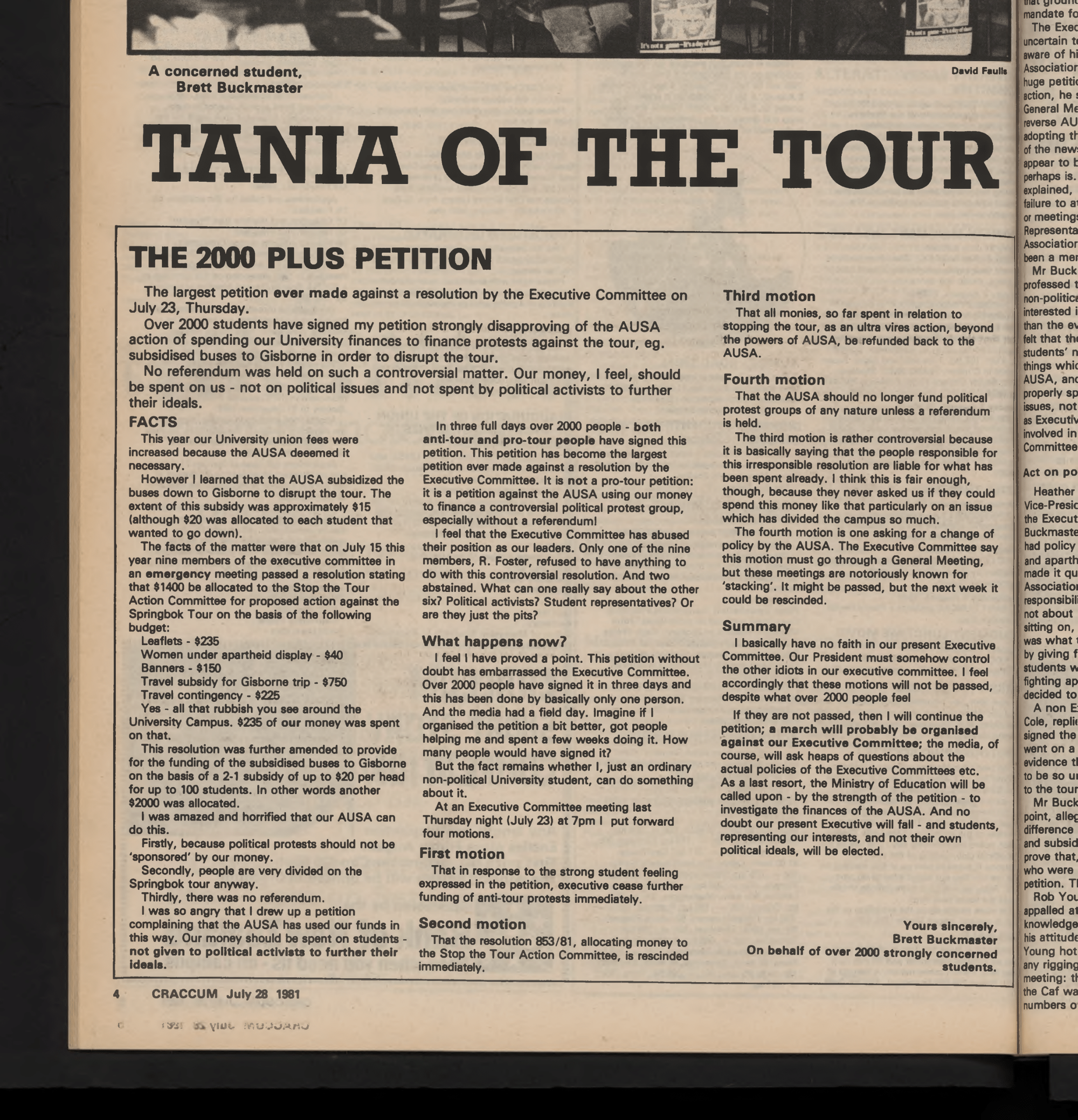
Act One: Brett's Riposte
The 2000 Plus Petition
The largest petition ever made against a resolution by the Executive Committee on July 23, Thursday.
Over 2000 students have signed my petition strongly disapproving of the AUSA action of spending our University finances to finance protests against the tour, eg. subsidised buses to Gisborne in order to disrupt the tour.
No referendum was held on such a controversial matter. Our money, I feel, should be spent on us—not on political issues and not spent by political activists to further their ideals.
FACTS
This year our University union fees were increased because the AUSA deemed it necessary.
However I learned that the AUSA subsidized the buses down to Gisborne to disrupt the tour. The extent of this subsidy was approximately $15 (although $20 was allocated to each student that wanted to go down).
The facts of the matter were that on July 15 this year nine members of the executive committee in an emergency meeting passed a resolution stating that $1400 be allocated to the Stop the Tour Action Committee for proposed action against the Springbok Tour on the basis of the following budget:
Leaflets - $235
Women under apartheid display - $40
Banners - $150
Travel subsidy for Gisborne trip - $750
Travel contingency - $225
Yes—all that rubbish you see around the University Campus. $235 of our money was spent on that.
This resolution was further amended to provide for the funding of the subsidised buses to Gisborne on the basis of a 2–1 subsidy of up to $20 per head for up to 100 students. In other words another $2000 was allocated.
I was amazed and horrified that our AUSA can do this.
Firstly, because political protests should not be 'sponsored' by our money.
Secondly, people are very divided on the Springbok tour anyway.
Thirdly, there was no referendum.
I was so angry that I drew up a petition complaining that the AUSA has used our funds in this way. Our money should be spent on students—not given to political activists to further their ideals.
In three full days over 2000 people—both anti-tour and pro-tour people have signed this petition. This petition has become the largest petition ever made against a resolution by the Executive Committee. It is not a pro-tour petition: it is a petition against the AUSA using our money to finance a controversial political protest group, especially without a referendum!
I feel that the Executive Committee has abused their position as our leaders. Only one of the nine members, R. Foster, refused to have anything to do with this controversial resolution. And two abstained. What can one really say about the other six? Political activists? Student representatives? Or are they just the pits?
What Happens Now?
I feel I have proved a point. This petition without doubt has embarrassed the Executive Committee. Over 2000 people have signed it in three days and this has been done by basically only one person. And the media had a field day. Imagine if I organised the petition a bit better, got people helping me and spent a few weeks doing it. How many people would have signed it?
But the fact remains whether I, just an ordinary non-political University student, can do something about it.
At an Executive Committee meeting last Thursday night (July 23) at 7 p.m. I put forward four motions.
First Motion
That in response to the strong student feeling expressed in the petition, executive cease further funding of anti-tour protests immediately.
Second Motion
That the resolution 853/81, allocating money to the Stop the Tour Action Committee, is rescinded immediately.
Third Motion
That all monies, so far spent in relation to stopping the tour, as an ultra vires action, beyond the powers of AUSA, be refunded back to the AUSA.
Fourth Motion
That the AUSA should no longer fund political protest groups of any nature unless a referendum is held.
The third motion is rather controversial because it is basically saying that the people responsible for this irresponsible resolution are liable for what has been spent already. I think this is fair enough, though, because they never asked us if they could spend this money like that particularly on an issue which has divided the campus so much.
The fourth motion is one asking for a change of policy by the AUSA. The Executive Committee says this motion must go through a General Meeting, but these meetings are notoriously known for 'stacking'. It might be passed, but the next week it could be rescinded.
Summary
I basically have no faith in our present Executive Committee. Our President must somehow control the other idiots in our executive committee. I feel accordingly that these motions will not be passed, despite what over 2000 people feel.
If they are not passed, then I will continue the petition; a march will probably be organised against our Executive Committee; the media, of course, will ask heaps of questions about the actual policies of the Executive Committees etc. As a last resort, the Ministry of Education will be called upon—by the strength of the petition—to investigate the finances of the AUSA. And no doubt our present Executive will fall - and students, representing our interests, and not their own political ideals, will be elected.
Yours sincerely,
Brett Buckmaster
On behalf of over 2000 strongly concerned students.
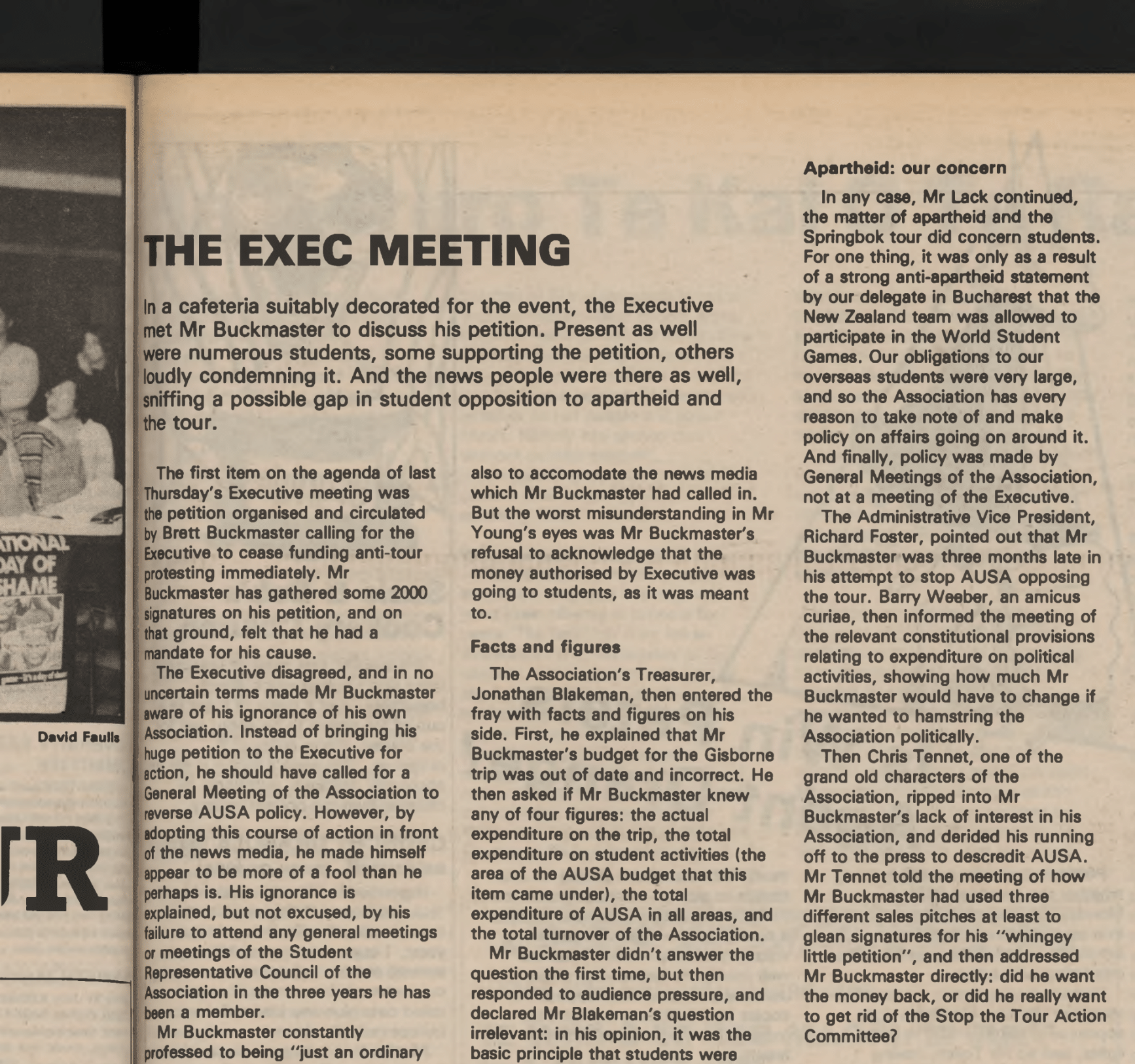
Act Two: AUSA's Parry
The Exec Meeting
In a cafeteria suitably decorated for the event, the Executive met Mr. Buckmaster to discuss his petition. Present as well were numerous students, some supporting the petition, others loudly condemning it. And the news people were there as well, sniffing a possible gap in student opposition to apartheid and the tour.
The first item on the agenda of last Thursday's Executive meeting was the petition organised and circulated by Brett Buckmaster calling for the Executive to cease funding anti-tour protesting immediately. Mr. Buckmaster has gathered some 2000 signatures on his petition, and on that ground, felt that he had a mandate for his cause.
The Executive disagreed, and in no uncertain terms made Mr. Buckmaster aware of his ignorance of his own Association. Instead of bringing his huge petition to the Executive for action, he should have called for a General Meeting of the Association to reverse AUSA policy. However, by adopting this course of action in front of the news media, he made himself appear to be more of a fool than he perhaps is. His ignorance is explained, but not excused, by his failure to attend any general meetings or meetings of the Student Representative Council of the Association in the three years he has been a member.
Mr. Buckmaster constantly professed to be "just an ordinary non-political student," more interested in purely campus affairs than the events of the real world. He felt that the Executive was wasting students' money "willy-nilly" on things which shouldn't concern AUSA, and that the money would be properly spent on purely student issues, not on political activists such as Executive members or the students involved in the Stop the Tour Action Committee (STAC).
Act on policy
Heather Worth, the Education Vice-President, began the case for the Executive, pointing out to Mr. Buckmaster that the Association had had policy on the Springbok Tour and apartheid for many years. She made it quite clear that the Association had never shied from its responsibility to that policy, and was not about to now. Policy was not for sitting on, but for acting on, and that was what the Association had done by giving financial assistance to those students who were so committed to fighting apartheid that they had decided to go to Gisborne.
A non Executive member, Terry Cole, replied, saying that 2000 people signed the petition, while 2000 people went on a march, and on that evidence the Association had no right to be so unqualified in its opposition to the tour.
Mr. Buckmaster carried on that point, alleging that there was a difference between being anti-tour and subsidising protests, and to prove that, he asserted that people who were anti-tour had signed his petition. The money was the thing.
Rob Young, the Sports Rep, was appalled at Mr. Buckmaster's lack of knowledge of his Association, and at his attitude towards the meeting. Mr. Young hotly denied that there was any rigging of that night's Executive meeting: the reason for holding it in the Caf was the expected large numbers of students attending, and also to accommodate the news media which Mr. Buckmaster had called in. But the worst misunderstanding in Mr. Young's eyes was Mr. Buckmaster's refusal to acknowledge that the money authorised by Executive was going to students, as it was meant to.
Facts and Figures
The Association's Treasurer, Jonathan Blakeman, then entered the fray with facts and figures on his side. First, he explained that Mr. Buckmaster's budget for the Gisborne trip was out of date and incorrect. He then asked if Mr. Buckmaster knew any of four figures: the actual expenditure on the trip, the total expenditure on student activities (the area of the AUSA budget that this item came under), the total expenditure of AUSA in all areas, and the total turnover of the Association.
Mr. Buckmaster didn't answer the question the first time, but then responded to audience pressure, and declared Mr. Blakeman's question irrelevant: in his opinion, it was the basic principle that students were concerned with.
Heather Worth then had another question for Mr. Buckmaster: could he explain the difference between subsidising student's travel to Easter Tournament or to a national Maori hui in Wellington and subsidies for the Gisborne protesters? Mr. Buckmaster again evaded his questioner, and again dismissed the question as irrelevant.
Duty to the past
Peter Shearer, the Chairperson of the Students' Representative Council, made a very strong statement about the tradition of students. He pointed out that some 40,000 students had been members of the Association since its anti-apartheid policy had been adopted 12 years ago, and that there had never been any moves to change that policy. This year, when there was an opportunity to action that policy, 60 students put up their own money and their own courage and went to show AUSA's stand; AUSA's subsidy amounted to 2¢ for each of the 40,000 past students those 60 represented, and if Mr. Buckmaster so desired, Mr. Shearer would let him have his 2¢ right then.
Bob Lack, the Association Secretary, began his speech with an observation that it was sad to think that people had to be rude to those who stood by their principles. He then answered Mr. Blakeman's questions of Mr. Buckmaster, noting that approximately $1200 in total would be expended, and that this amounted to 1% of the student activities budget, 0.5% of AUSA's total expenditure and 0.01% of the Association's total turnover. He also noted that AUSA was bound to follow the rules of its constitution and its policy, and that the Executive had done so. It was completely unrealistic to hope to get the money back now, all that could be done would be to change policy, and Executive was not the place to do that.
Apartheid: our concern
In any case, Mr. Lack continued, the matter of apartheid and the Springbok tour did concern students. For one thing, it was only as a result of a strong anti-apartheid statement by our delegate in Bucharest that the New Zealand team was allowed to participate in the World Student Games. Our obligations to our overseas students were very large, and so the Association has every reason to take note of and make policy on affairs going on around it. And finally, policy was made by General Meetings of the Association, not at a meeting of the Executive.
The Administrative Vice President, Richard Foster, pointed out that Mr. Buckmaster was three months late in his attempt to stop AUSA opposing the tour. Barry Weeber, an amicus curiae, then informed the meeting of the relevant constitutional provisions relating to expenditure on political activities, showing how much Mr. Buckmaster would have to change if he wanted to hamstring the Association politically.
Then Chris Tennet, one of the grand old characters of the Association, ripped into Mr. Buckmaster's lack of interest in his Association, and derided his running off to the press to discredit AUSA. Mr. Tennet told the meeting of how Mr. Buckmaster had used three different sales pitches at least to glean signatures for his "whingey little petition", and then addressed Mr. Buckmaster directly: did he want the money back, or did he really want to get rid of the Stop the Tour Action Committee?
No more politics?
Mr. Buckmaster admitted that his objective was to stop STAC. Mr. Tennet then asked if the petitioner understood what an affiliated club was, and the petitioner replied that he wasn't a politician; anyway, STAC was very controversial. Mr. Tennet, barely containing his wonder at the naivety before him, then wanted to know if Mr. Buckmaster also wanted to get rid of the National, Labour and Social Credit clubs on campus because he didn't agree with their Politics.
With the ridiculousness of his position becoming more and more apparent, Mr. Buckmaster embarked on his right of reply. He repeated how strong he believed his support was, and how he believed that AUSA was intended solely for the immediate welfare of students. He interpreted his petition as saying that ordinary students had had enough of political activists.
Wayne McIntosh then put the motion, that the Executive cease further funding of anti-tour activities. The motion was lost, 9–0, with Foster abstaining, and Mr. McIntosh then adjourned the meeting for 15 minutes, and directed it to reconvene in the Council Room. The crowd dispersed, and the press gathered around Mr. Buckmaster to ask what had happened. Mr. Buckmaster replied that he obviously wasn't going to get anywhere at this meeting.
See you at the protests
It remains to be seen if he gets anywhere at all. He already has the press following him about, but The Coup in the May holidays showed how easy it is to dupe the media. Auckland students have already shown their opposition to the tour and apartheid by their presence at rallies and demonstrations: signatures are but straw votes compared to people standing up for their and others' rights.
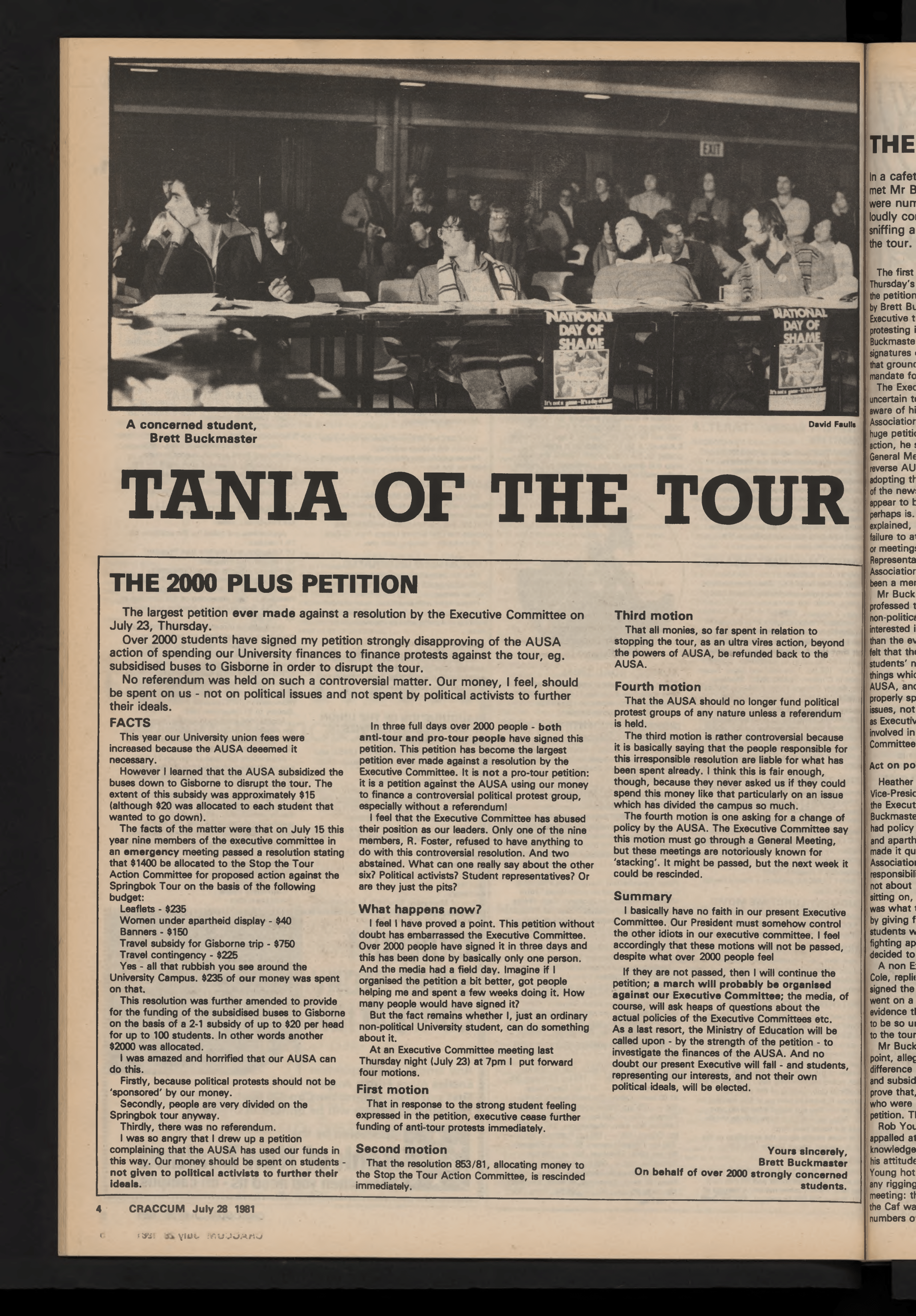
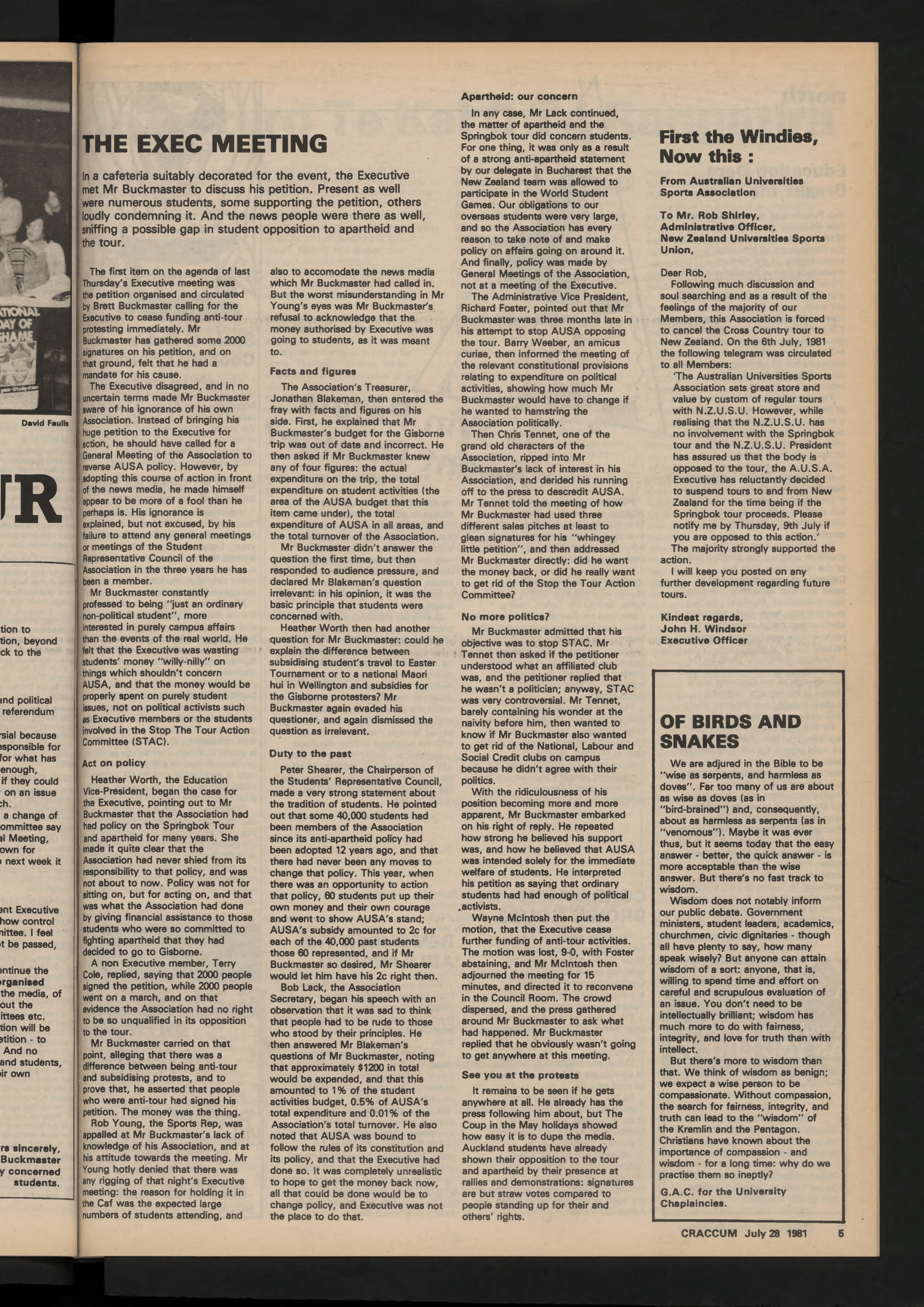
Digitised pages containing the original printed article.
You can access this specific piece alongside the rest of the articles on the magazine issue here.
Archivist's note: AUSA has since incorporated Te Tiriti o Waitangi alongside a Memorandum of Understanding with Ngā Tauira Māori (Māori Students' Association) in their latest constitution (as of July 2024).
Also there's a lot more typos, grammar and spelling errors in the printed version of this piece! Spot at least five of these errors and email them to managingeditor@craccum.co.nz to be invited to a private screening of curated Palestinian films and short films hosted at a super secret location within the university campus. Dates and details are kept secret except for those who email the correct answers 😜
Disclaimer:
The views and opinions expressed by authors in past issues of Craccum do not necessarily reflect those of the current Craccum staff, UOA students or AUSA. Craccum does not endorse any content or viewpoints published and is not responsible for the accuracy or reliability of the information previously published.





